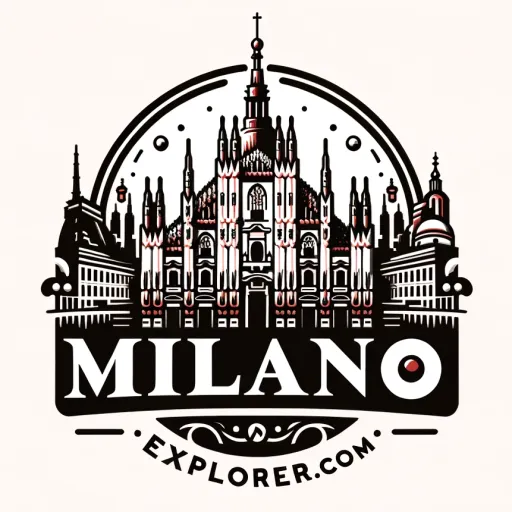Milan serves as Italy’s pulsating heart of business and fashion, an essential destination for professionals from around the globe.
Navigating the city’s business etiquette requires an understanding of its rich culture and a respect for local traditions.
Foreign business travelers should acquaint themselves with the subtleties of Milanese protocol to ensure successful interactions.
From appreciating the historical significance of landmarks like the Duomo and The Last Supper, to engaging within the refined ambiances of La Scala for after-hours networking, every aspect contributes to a coherence of professional and cultural fluency.
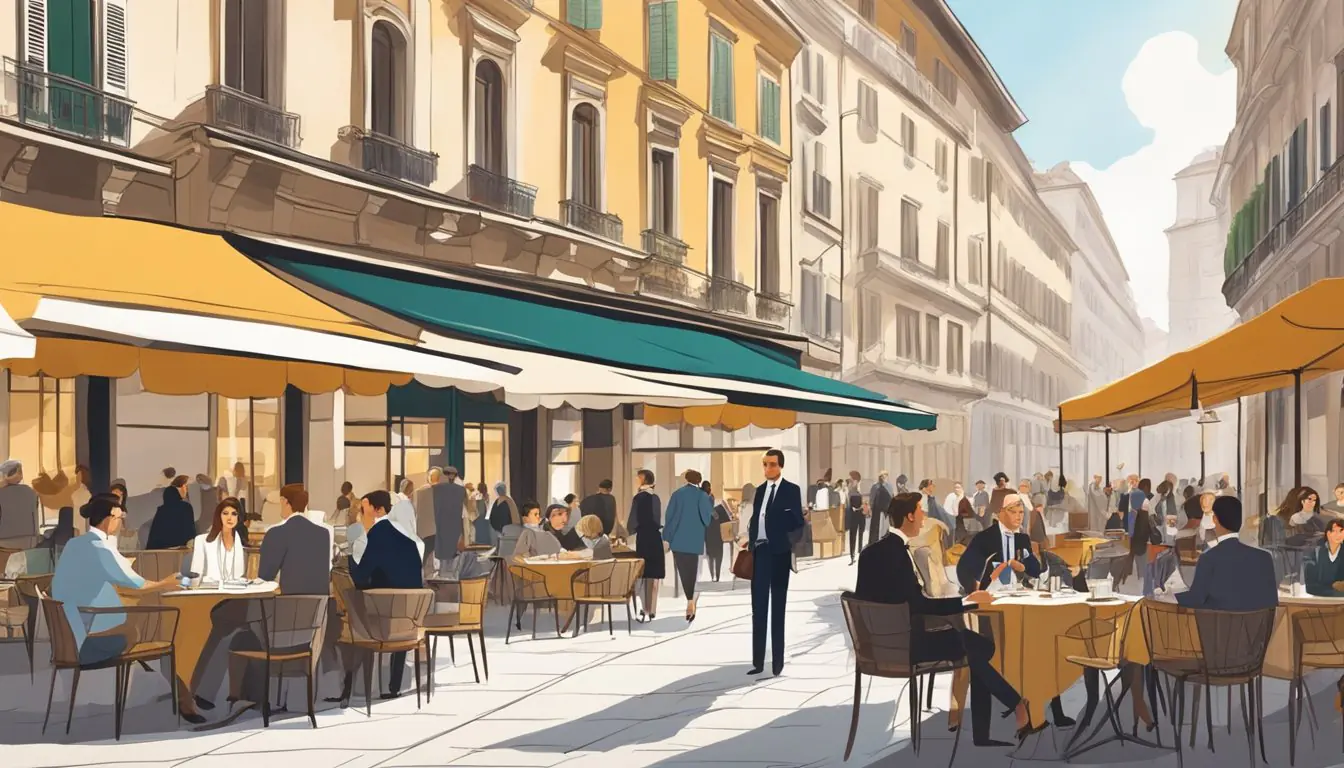
Transportation for the international traveler is efficient, with options such as Linate Airport offering accessibility and convenience.
Visitors witness a seamless blend of Renaissance influence through works of Leonardo da Vinci and a contemporary zest for life in areas like the Brera district, synonymous with innovation and design.
When it comes to dining and leisure, Milan offers a wealth of options to suit business agendas.
Understanding the importance of a well-chosen venue for lunch meetings, or appreciating the refined tastes of Milanese cuisine, exemplify cultural competency.
Milan business travel tips
Key Takeaways
- Milan’s business culture thrives on a blend of historical appreciation and contemporary etiquette.
- Transportation options like Linate Airport provide convenient access for global business travelers.
- Success in Milanese business settings often hinges on an understanding of local dining and networking customs.
History and Culture
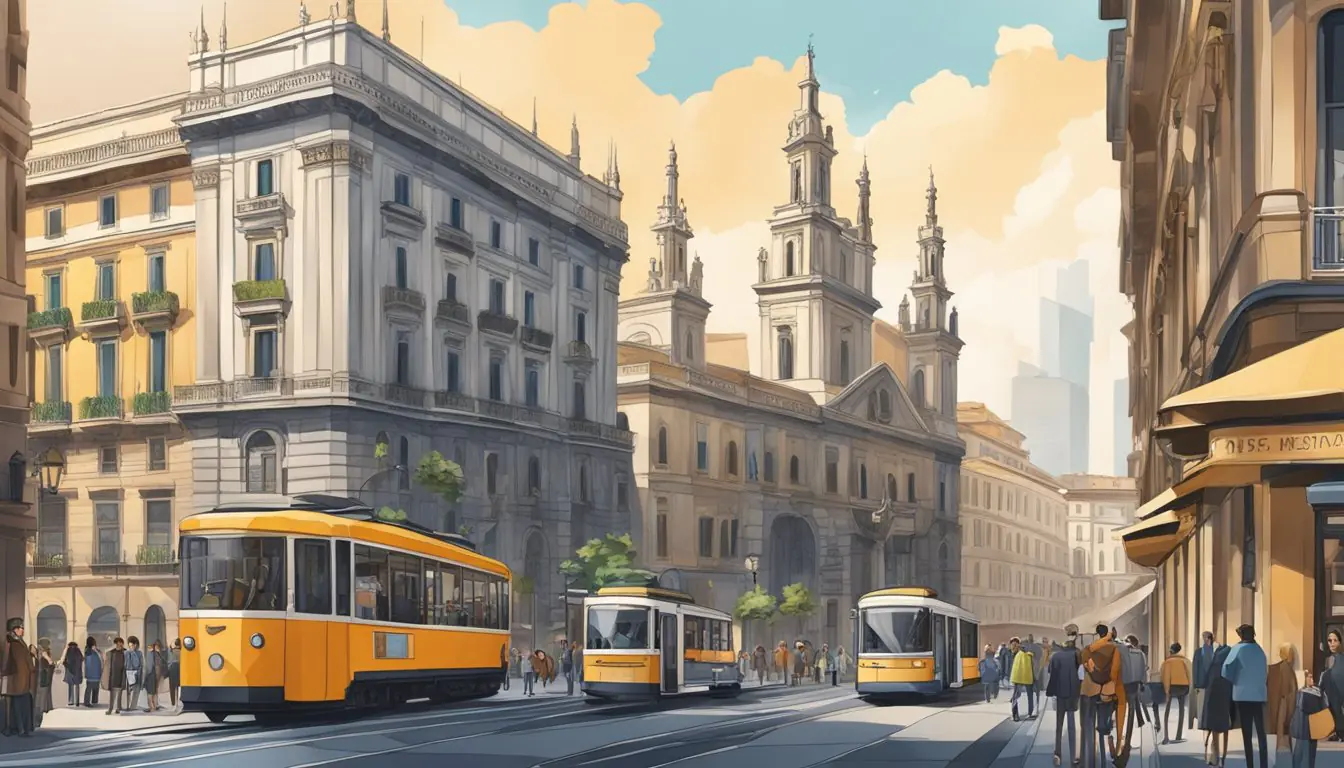
Milan not only stands as an economic powerhouse but also a city with a deep historical and cultural bedrock. Its landmarks bear witness to a past that intertwines with the fabric of present-day business practices.
Historic Landmarks
The Duomo di Milano is more than just an architectural masterpiece; it’s a cultural landmark that took nearly six centuries to complete. Its spires reach towards the sky, a testament to the city’s aspirations and achievements.
Just a short distance from the Duomo, the Sforza Castle hosts numerous art collections and serves as a reminder of Milan’s strategic importance. It underscores a lineage of power and patronage that shaped the Renaissance.
Cultural Significance
Milan’s cultural landscape is adorned with contributions from Leonardo da Vinci, whose influence is evident in the refectory of the Convent of Santa Maria delle Grazie, where his iconic The Last Supper is displayed.
The city’s connection to the arts is further solidified at the La Scala opera house, a symbol of Italian excellence in music and performance art.
Meanwhile, the Brera District serves as the city’s bohemian heart, housing the Brera Academy, where art and culture have thrived for centuries.
Travel and Transportation
For business travelers, navigating Milan efficiently is crucial. This section provides essential information on travel and transportation options within the city, as well as important airport details.
Navigating the City
Navigating Milan is relatively straightforward thanks to its comprehensive public transport system that includes the metro, trams, and buses, seamlessly connecting all major business districts and tourist attractions.
Business travelers should consider purchasing a transportation pass for unlimited travel, which is both time-saving and cost-effective.
Frequent trams serve as a scenic way to traverse the city, offering views of Milan’s architectural beauty while reaching one’s destination.
Airport Information
Milan is served by two main airports, Malpensa Airport and Linate Airport.
Malpensa (Malpensa Airport) is the largest, located about 50 kilometers from the city center and is well-connected by the Malpensa Express train service.
Linate Airport (Linate Airport) is closer, just about 7 kilometers away, and mainly handles domestic and short international flights.
Travel tips for a swift passage include checking train and bus schedules in advance, and considering location when booking hotels for ease of access to either airport.
Fashion and Design
Milan’s standing as a global epicenter for fashion and design is reflected in its attire standards and the prominence of design events that shape global style trends.
The Fashion Capital
Milan is recognized as a fashion capital due to its history, the presence of high-end boutiques, and the Quadrilatero della Moda—the city’s illustrious fashion district.
Business travelers should be aware that the dress code in Milan leans towards stylish, with a strong preference for well-tailored suits.
When attending meetings or networking events, they should match their attire to the expectations of this sophisticated milieu.
Known for setting fashion trends, visitors can find inspiration by exploring the flagship stores and designer showrooms that line the district’s streets.
-
Quadrilatero della Moda notables:
- Via Montenapoleone: Luxury brands
- Via della Spiga: Exclusive boutiques
- Corso Venezia: Elegant showrooms
Design Influence
During events like the Salone del Mobile, Milan becomes the focal point for the latest in design innovation.
Taking place in April, this fair attracts creatives and professionals from across the globe.
Understanding the city’s design language is crucial for anyone looking to establish connections within the Milanese business landscape.
Milan’s approach to design incorporates a distinct blend of traditional craftsmanship and forward-thinking trends—indicative of the city’s identity as a hub of creativity.
-
Salone del Mobile highlights:
- Cutting-edge furniture design
- Home decor trends
- Networking with designers and architects
Business and Economy
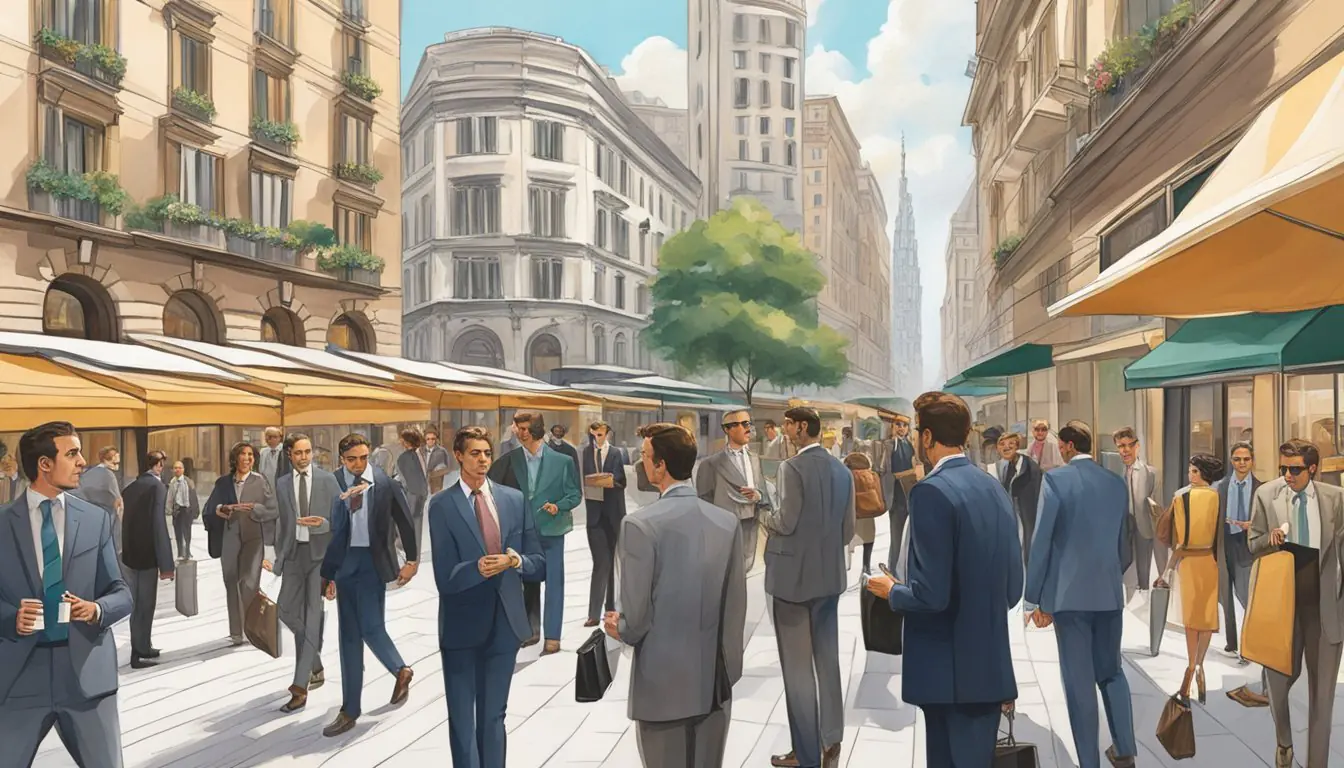
Milan, as a premier global city, stands at the forefront of international business and finance. It is particularly renowned for its dynamic work environment and strict business etiquette, reflecting Italy’s broader work culture.
Business Opportunities
Milan is the economic engine of Italy and offers ample business opportunities across diverse sectors.
Its business districts, such as Porta Nuova and the historic centre, are bustling with activity, housing many corporate headquarters.
Key industries include fashion, design, finance, and manufacturing.
Networking is vital, and there are numerous meeting rooms and hubs where professionals can connect and collaborate.
Moreover, events and conferences frequently take place, providing an ideal backdrop for business travel.
Financial Institutions
The city is home to the Italian Stock Exchange, which is critical to Milan’s status as a financial hub.
Many financial institutions are headquartered here, offering a full spectrum of services for both domestic and international clients.
For anyone embarking upon a business trip to Milan, understanding the city’s financial landscape is crucial, from working hours to the need for formal attire.
Milan adheres to international standards of finance, which allows for seamless integration with global markets.
Food and Lifestyle
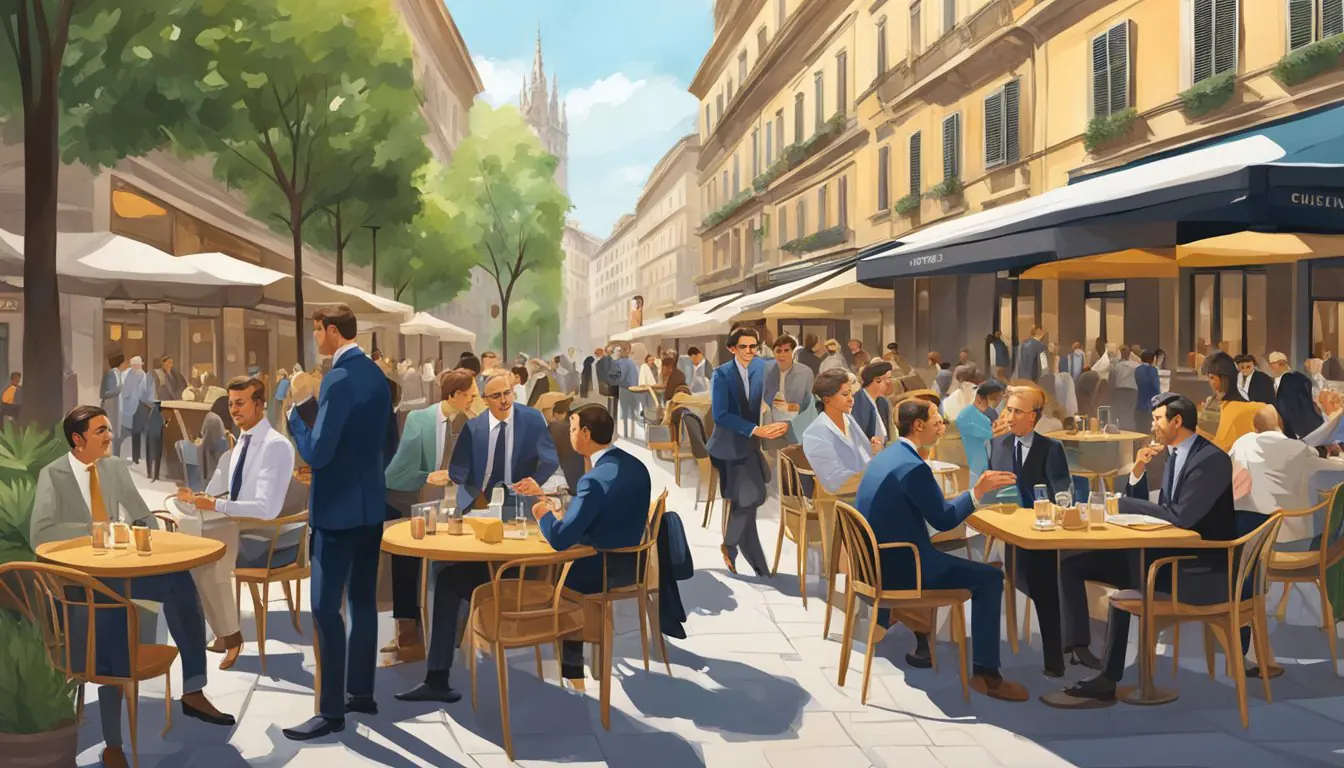
When visiting Milan for business, understanding the local food and lifestyle is key to a holistic travel experience.
Culinary Delights
Milan is a city that takes pride in its rich culinary offerings, from risotto alla Milanese to the tradition of aperitivo.
The risotto alla Milanese, a creamy saffron-infused dish, is a staple that every visitor should try.
For those looking to enjoy Milan’s social dining scene, the aperitivo is an experience not to be missed; this happy hour tradition is where locals and visitors alike indulge in cocktails and small bites at the end of the workday.
Business travelers can witness this firsthand at places like the Terrazza Aperol, where enjoying an Aperol Spritz offers a taste of the city’s favorite drinks and a view into Milanese social culture.
Living in Milan
Accommodation in Milan ranges from modern hotels equipped with all amenities for the discerning business traveler to more sustainable options reflecting the city’s increasing push towards environmental sustainability.
Visitors looking for luxury can find solace in well-appointed hotels, whereas those seeking a more local experience might consider boutique lodgings nestled in the heart of Milan.
Part of the Milanese lifestyle involves a deep appreciation for the arts, with the world-famous opera at La Scala serving as a testament to the city’s cultural devotion.
Furthermore, Milan is also a city where coffee culture is taken seriously, with an emphasis on quality; a simple latte isn’t just a drink, but a ritual to be savored.
Leisure and Entertainment
While visiting Milan for business, one should not miss out on the vibrant arts scene and the renowned shopping districts that the city has to offer.
Post-business hours, there are ample opportunities for entertainment and relaxation, blending well with Milan’s industrious spirit.
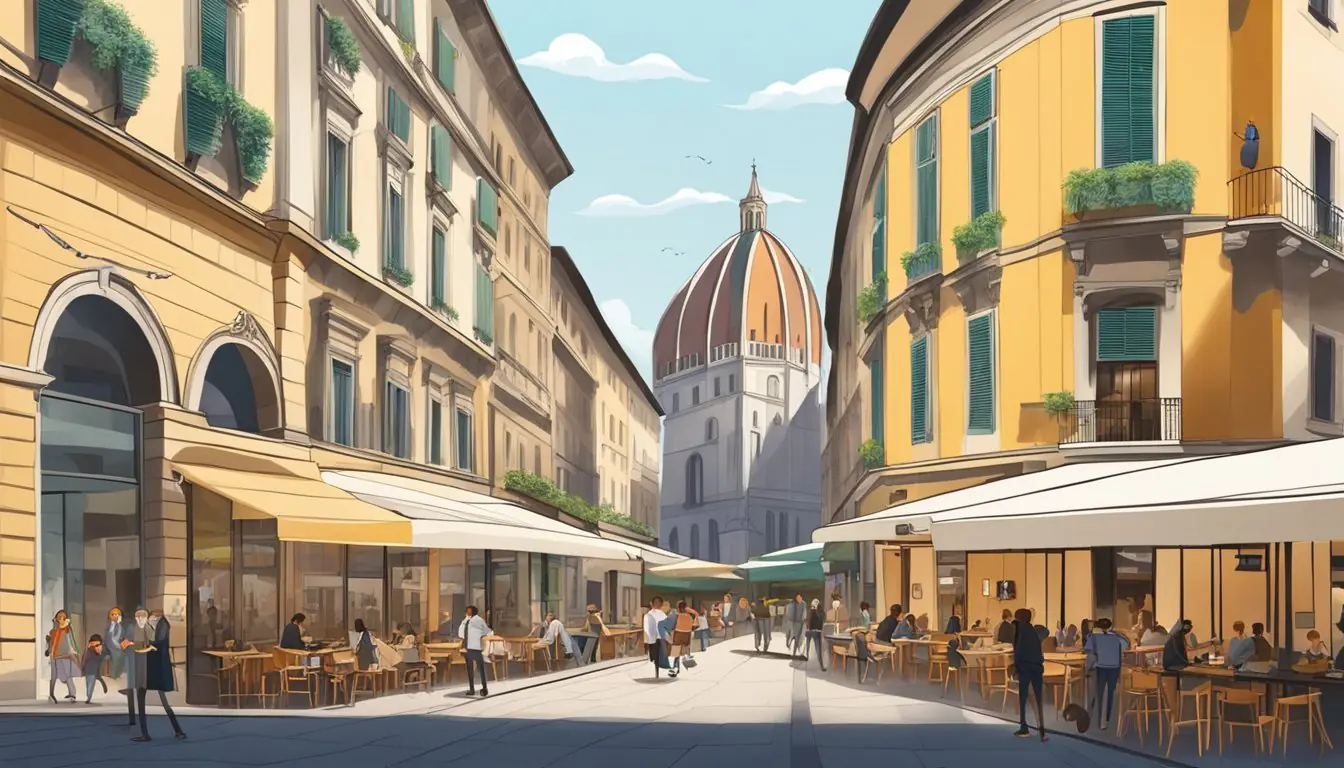
Arts and Performance
The city of Milan is replete with cultural richness.
Art aficionados can explore the MUDEC, the Museum of Cultures, for an eclectic mix of contemporary and historical exhibits.
In the evening, one may indulge in the sophisticated milieu of La Scala, an illustrious opera house known for its world-class opera and ballet performances.
A visit to Milan is incomplete without experiencing its storied tradition of performing arts.
Shopping and Discounts
Milan, Italy’s sartorial capital, offers a myriad of shopping experiences, from high-end boutiques in the Quadrilatero della Moda to the bustling streets of Corso Buenos Aires.
For those seeking quality Italian fashion at reduced prices, shopping at the numerous outlet stores can yield significant discounts.
Engaging in the city’s retail therapy is a delightful way for a traveler to unwind after a day of meetings.
Whether one is in search of bespoke suits or contemporary designs, Milan serves as the perfect backdrop for a shopping escapade.
Visitors can end their shopping spree by enjoying a classic Negroni, Milan’s iconic cocktail, at one of the city’s elegant lounges or bustling bars.
Respect and Etiquette
In navigating Milan’s corporate environment, respect and adherence to local business etiquette stand paramount.
Visitors must be cognizant of Italian professional and social norms, ensuring their behavior fosters positive working relationships.
Understanding Local Customs
Milanese conduct is rooted in formality and respect.
It is essential for visitors to be aware of conventional greetings, which typically involve a handshake and the usage of courtesy titles such as “Signore” or “Signora” until invited to use first names.
Attending meetings or social functions punctually implies respect for one’s Italian counterparts; time is valued, and being late can be perceived as inconsiderate.
Business Etiquette
The business customs of Milan require a blend of formality and personal connection.
Dress code is taken seriously, with a preference for formal attire Representative of the city’s fashion-centric reputation.
Men should opt for suits, and women should choose elegant business wear, ensuring their appearance aligns with Milan’s fashion ethos.
Building relationships based on trust and mutual respect is at the heart of Italian business etiquette.
Initial meetings may focus on establishing rapport before delving into transactional discussions.
Visitors should also be mindful of local attitudes towards smoking; while it’s a common practice, one should always ask before lighting up in business settings or inquire about designated smoking areas, respecting personal and public space.
Conclusion

Visitors to Milan should ensure they adhere to local business customs to make a positive impression.
Dressing sharply is essential, as it signals professionalism and respect in Italian business culture.
It’s advisable to schedule meetings well in advance and be punctual, as both are valued in the Milanese corporate environment.
Understanding and navigating the city is made easier thanks to the well-established transportation options.
For accommodation and dining recommendations tailored for the business traveler, the local hospitality industry offers numerous options that cater to various tastes and preferences.
For insight into Milan’s networking etiquette and professional norms, tourists are encouraged to familiarize themselves with common practices to foster productive local connections.
Integrating into the Milanese work culture is smoother for those who take time to appreciate its nuances.
When participating in meetings, exercise clear communication, and be attentive to the subtleties of Italian body language and gestures.
Embracing these practices demonstrates respect for the Italian way of conducting business and increases the prospects for successful collaborations.
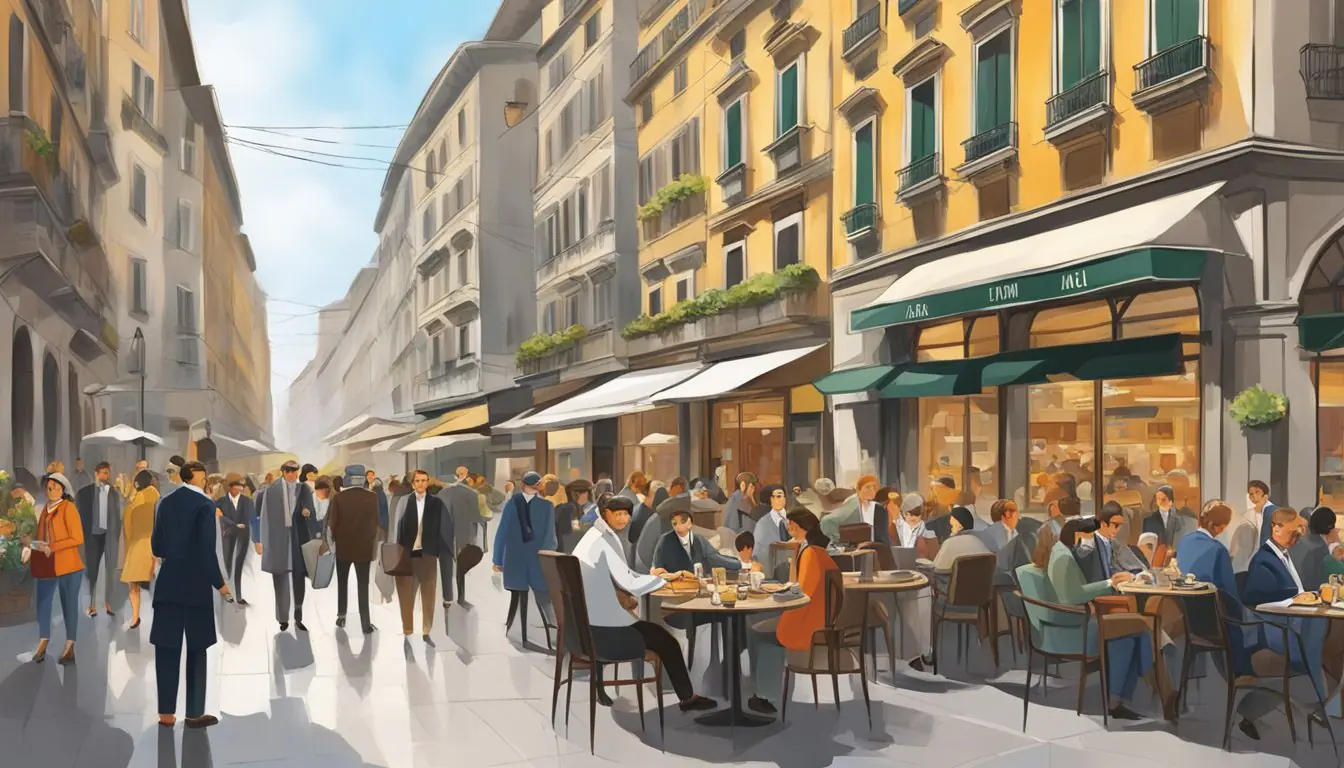
Frequently Asked Questions
Understanding the local business customs is crucial for any foreigner looking to establish successful partnerships in Milan. This section aims to clarify common uncertainties related to business interactions in the vibrant economic heart of Italy.
What are the key customs related to business card exchanges in Italy?
In Milan, as in the rest of Italy, the exchange of business cards is a formal ritual.
One should always offer their business card with the right hand, and take a moment to review any received card before putting it away. This shows respect and acknowledgment of the other person’s details.
What dress code is expected for business meetings in Milan?
Milan is a fashion capital, and business attire is no exception.
For men, a high-quality suit and tie are expected, while women often wear elegant business suits or dresses. The emphasis is on looking well-groomed and professional, as appearance can speak volumes in the Milanese business scene.
What should one be aware of when giving gifts in a professional setting in Italy?
Giving gifts in a professional context is a nuanced affair; they should be modest, not overly expensive, and preferably an item that reflects one’s home country or company.
Gifts are not opened in front of the giver, so one should not expect immediate feedback on the present.
Could you describe the primary cultural differences in business practices between the U.S. and Italy?
One major cultural difference lies in the pace of business; Italy often has a more relaxed approach compared to the U.S., with a greater emphasis on building personal relationships before venturing into agreements.
Punctuality is also less stringent than in the U.S., and a small delay is commonly accepted.
What are some general etiquette guidelines for foreign businessmen and women attending meetings in Milan?
Foreign business professionals should greet their Italian counterparts with a firm handshake.
While English is widely spoken in the business community, learning a few phrases in Italian can go a long way.
Make eye contact, as it conveys confidence and sincerity, and be mindful of the hierarchy during discussions and negotiations.
How does one navigate social and business entertainment scenarios while in Milan?
Business entertainment, such as dining out, is a staple of building relationships in Milan.
Guests should wait to be shown where to sit, as there may be a seating protocol to follow.
It’s polite to sample all the dishes offered, and it’s customary to finish the meal with an espresso.
The host usually handles the bill, but offering to pay is seen as polite.
